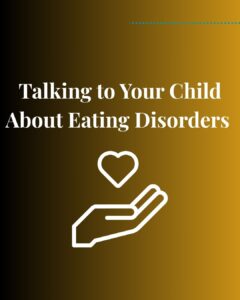If you’re a parent of a child struggling with an eating disorder, you’ve likely asked yourself this question more than once: How do I bring up my concerns without pushing them away?
It’s a valid—and deeply human—fear. Many parents worry that addressing eating behaviors will trigger shame, secrecy, or defensiveness. It’s hard to know how to start the conversation, especially when you’re watching your child suffer and feeling powerless to stop it.
But here’s the truth: while it is scary and hard, it’s also your responsibility to show up for your child, even when it’s uncomfortable.
Start With Yourself: Calm Your Own Anxiety First
When you’re worried about your child’s health, it’s natural for your own anxiety to spike. That’s why one of the most important first steps is to pause, take a deep breath, and regulate yourself. A dysregulated parent is less likely to lead a productive conversation.
Before you speak, ask yourself these questions:
- Am I grounded enough to stay present, even if the response is defensive?
- Am I approaching this with curiosity and compassion—or fear and control?
Your calm presence creates safety—even when the topic is difficult
Step Into Their Shoes—Then Step Into Your Role
Children and adolescents with eating disorders are often stuck in a battle between their true selves and the illness. The eating disorder voice can be rigid and controlling, fueled by fear and emotional pain. Many behaviors are attempts to avoid distress—even if they’re harmful.
Remember:
- Your child didn’t choose this.
- They probably don’t want to have this conversation.
- And yes, they may feel angry, ashamed, or exposed.
Keep the Door Open—And Stay Steady
There’s no perfect script or magic phrase. What your child needs most is for you to keep showing up—with love, clarity, and firm, compassionate boundaries.
It’s tempting to avoid hard conversations when they seem to cause distress. But avoidance allows the eating disorder to get worse. Discomfort in the moment doesn’t mean you’ve done the wrong thing—it often means you’re getting closer to the illness.
Let them know:
- I see what’s
 happening, even if it’s hard to talk about.
happening, even if it’s hard to talk about. - I’m not angry or ashamed of you. I’m concerned and I care deeply.
- I love you too much to ignore this or pretend it’s not serious
Holding boundaries and taking action may feel uncomfortable—but eating disorders are dangerous and can escalate quickly. Acting early and decisively gives your child the best chance at recovery. You’re not just keeping the door open—you’re walking through it and guiding them out.
If you need support navigating this conversation, I’d be honored to help. Reach out here:
